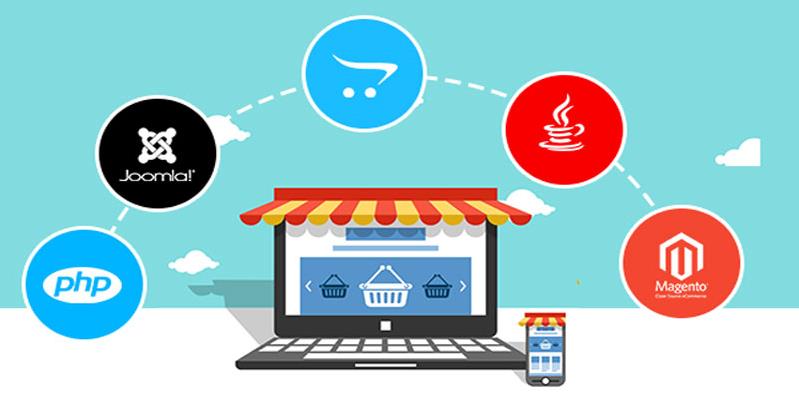Which is the best e-commerce website development technology?
Modern e-commerce technologies have evolved to a level where businesses hardly need to design and develop e-commerce websites or web applications from scratch.
Because these technologies are readily available, they make the development ultra-convenient and can be implemented in minimum turnaround time.
Also, these e-commerce technologies are now fully mobile-optimized which simply means that they are ready for smart devices – which are getting 60 of all web searches.
This post brings in the best and the most trending e-commerce website development technologies. Let us learn about them and then, after going through their advantages, we will assess the best one of them. Let’s begin.
WooCommerce
With currently powering 380,000 websites and holding a market share of 28%, WooCommerce as a WordPress plug-in is one of most popular e-commerce website development technologies available in the market. WooCommerce is widely adopted for its simple installation, customization and free product.
WooCommerce is a useful e-commerce technology for small businesses which are looking for a user-friendly and cheap solution to migrate over to, but without any compromise in features and functionality.
The plug-in provides a wide range of features and functionalities which are available for free as it is open-source like WordPress itself.
WooCommerce provides businesses with an easy way to launch their stores online. As we know that taking a business online is already a hurdle in itself, but no business-owner wants the e-commerce platform they select to be one. WooCommerce is one of the most suitable technologies for the businesses already using WordPress websites.
Following are some top of the advantages of WooCommerce – the free e-commerce plug-in for small online retail businesses.
- Freely available. It's free right out the box and, it comes with a wide range of extensions and features.
- Flexibility: A WooCommerce based platform is capable of selling physical, virtual, downloadable and even affiliate/ external products.
- Familiarity: It's a plug-in for WordPress; the most popular CMS in the world which already powers 26% of the Web.
- Customizability: It comes with access to a wide range of themes and plug-ins which allow making customizations for almost all requirements.
- Simple yet smart: WordPress is loved by website owners and even web developers because of traits like simplicity, and user-friendliness. In most cases, these traits are not associated with professionalism. But a WordPress website with WooCommerce plug-in easily disapproves this perception, too.
- Scalability: One of the biggest benefits of using WooCommerce is its ability allowing it to be scaled as per the requirements. Its design fully supports enhancement and growths that every company aims to achieve.
- Multiple payment gateway support: Another biggest advantage of using WooCommerce is that it offers the payment gateway choices beyond on-site credit card payments. It means that apart from on-site credit card payments, the site owner is able to accept payment for the purchase in 117 different options along with the leading once like PayPal, Amazon Payment Authorize.net and Stripe.
Magento
Magento is the second most widely used e-commerce technology. Contrary to WooCommerce, which entirely depends on WordPress CMS, Magento itself is a standalone CMS designed for e-commerce websites. Magento powers one-fourth of the total number of e-commerce stores around the world. It’s a fully reliable and scalable e-commerce technology. Brands like Burger King, Huawei, Pepe Jeans & Liverpool F.C. already have online stores based on Magento. As of Datanyze.com’s findings, there are currently 165,726 Magento based websites and, the number keeps increasing with every passing year. Magento is such matured e-commerce technology as e-commerce store-owners using other technologies like OpenCart, osCommerce, VirtualMart, PrestaShop, ZenCart, UberCart are migrating to Magento.
The new Magento version 2 offers more advanced features which make it the most preferred platform. For customers, the new Magento now offers easy checkout process, speedy page loading, and pleasant shopping experience. For admin, it provides productivity, improvements in control panel, uncompromising scalability performance, worriless maintenance and upgrades.
Here are the top advantages of using Magento
- Free technology: Unless yours is the huge e-commerce site, you can keep with the free version of Magento. Of course the free version is open-source but being free doesn’t mean it has any sort of restrictions. In fact, Magento was initially launched as a free version. Later, due to overwhelming response of big enterprises, Magento launched its paid version – Enterprise Edition which is purely derived from its free version - Magento Community Edition.
- Available in three sorts: Magento is available in its three forms. The widely adopted version is Community Edition which is open-source. The company launched the paid version – Enterprise Edition in March 2016. This version is designed for large businesses which need technical support with installation, usages, configuration, and troubleshooting. They launched another paid version - Magento Enterprise Cloud Edition (ECE) in April 2016. ECE is launched as Platform as a Service (PaaS) which enables rapid deployment of fully customized, secure and scalable web store fronts, combined with leading hosting and managed infrastructure.
- SEO-friendly: The enterprise version of Magento has excellent support which makes product-page and descriptions optimization quite simple. Also, it generates SEO-friendly URLs and metas which are preferred by search engines, too. The sites created using Magneto are also fully mobile responsive which means that they do not need additional customization. Magento bears the best possible compatibility with browsers and screen sizes. Google values SEO-friendliness of Magneto and provides Magento-sites with better rankings in comparison to those without Magento.
- Developer-friendly: Magento developers have said that they are happy being a Magento developer. They find it easy and user-friendly to add pages as well as update content and media to the website.
- Manage multiple stores from single dashboard: Businesses experience difficulties when it comes to managing multiple stores through multiple dashboards. But, Magento frees them from this burden, too. It lets a business manage all its stores from single administrative.
- It comes with the best of the marketing tools: Magento based stores have support from many tools & technologies which make their promotion easier. It provides several options like flexible coupons, private sales, multi-tier pricing, landing-page tools for campaigns, etc.
- Scalability: Because Magento uses PHP, it’s easy to add new features to it and even customize the existing one as per the need of a project.
- Security: Magento is more secure in comparison with other content management systems. All the information, records, and transaction are private and secure when the server runs on a separate system
- Mobile-support: Magento 2 comes with excellent mobile support. It works efficiently on smartphones, tablets and notebook computers.
Shopify
Shopify is the third largest e-commerce platform. Shopify, with a market share of 11.70%, is currently powering more than 232,481 websites all over the world, according to datanyze.com. It’s easy to set up Shopify. It provides handy dashboard which allows website administrators to rapidly add products to their websites and customize their look & feel. When moving from other platform to Shopify, it lets you easily import all your products from your previous websites. The technology of Shopify is continuously evolving to meet growing needs of e-commerce stores. Following are the top of the advantages of the Shopify.
- Easy set up: Shopify certainly has advantages over other online and self-hosted platforms. It provides a cleaner and intuitive admin interface with everything logically structured at their places. Also, It offers complete documentation and several video-guides helping users easily set up a Shopify based e-commerce website.
- No tech worries: Basic-level stores can easily be launched without any technical support of developers. Shopify provides all software and hosting that make it easier to get up and running.
- Secure & reliable: Shopify is as reliable as other e-commerce technologies. Because it’s a hosted solution, it’s completely reliable in terms of dealing with sensitive customer information. The company takes care of maintaining servers and upgrades on its own. It simply means that store owners do not have to invest anything in performing maintenance related operations.
- 24/7 customer support: Shopify is quite responsive when it comes to providing customer support. They can be contacted for 24 hours a day and 7 days in a week. They instantly provide support via phone, email or chat.
- Mobile ready: Shopify is fully mobile-ready which means all themes are mobile-responsive. Also, the platform includes a free, built-in e-commerce shopping cart. Responsive mobile support will make an e-commerce store looking great on all devices, and customers can pick any device they want to use to purchase from your store.
- Customizable: Shopify supports customization which means site owners can get any look & feel and features to be added to their stores. Apart from Shopify’s own themes, ThemForest.com too offers tons to customizable themes.
- Shopify’s app store: Shopify has its own app store. It is a treasure in itself. It provides a wide range of functionalities to add to a store. Do you need adding reviews, loyalty programs, customer-wish-list and a lot more? Shopify offers a wide range of apps to make a store look feature-rich.
- SEO marketing tools: It comes with powerful search engine optimization features that help your website rank higher in search results.
- Own payment gateway: With dozens of integrated payment gateways, Shopify offers its own payment gateway powered by Stripe which does not charge transaction fee and provides benefit from lower credit card fees.
Django
Custom eCommerce solutions built using Django offer scalability, flexibility, and a wide range of features. Django's modular architecture makes it easier to add functionalities like product catalogs, payment gateways, and customer accounts. Security features like CSRF protection are built-in, making transactions more secure. With Django's extensive libraries and community support, you can integrate advanced features such as machine learning for personalized recommendations, all while maintaining speed and efficiency.
- Scalability: Easily handle increased traffic and product listings.
- Flexibility: Customize features to fit specific business needs.
- Security: Built-in CSRF protection and other security measures.
- Speed and Efficiency: Quick development and deployment.
- Modular Architecture: Easy to add or modify functionalities.
- Community Support: Access to extensive libraries and documentation.
- Advanced Features: Easier integration of machine learning, analytics, etc.
Conclusion
The numbers and advantages show that WooCommerce, Magento, and Shopify are the best e-commerce technologies available in the market. On the one hand, WooCommerce is advised to those stores which want to go online in minimum investments of time and money. On the other hand, Magento has matured to level where it can provide an ideal platform for every sort and size of e-commerce business. Shopify should be the third choice for any business which doesn’t want to go either with WooCommerce or Magento.
Related Posts
Ecommerce marketing relies heavily on understanding consumer behavior and psychology to drive engagement, conversions, and loyalty.
Are you thinking about migrating from one e-commerce platform to another? If yes, then you have come to the right place.
As a business owner, you have to address many challenges in your working life, but one of the most important for the long-term success of your organization is productivity.
Core Web Vitals is a set of performance metrics developed by Google to measure the quality of a website's user experience.
Building an effective website is a vital part of starting and sustaining any small business, and this guide can help you create one tailored specifically to a CBD company's needs.
Consumers in every industry often foster emotional connections with brands via tangible experiences they gain through their five senses.


















Comments
comments powered by Disqus